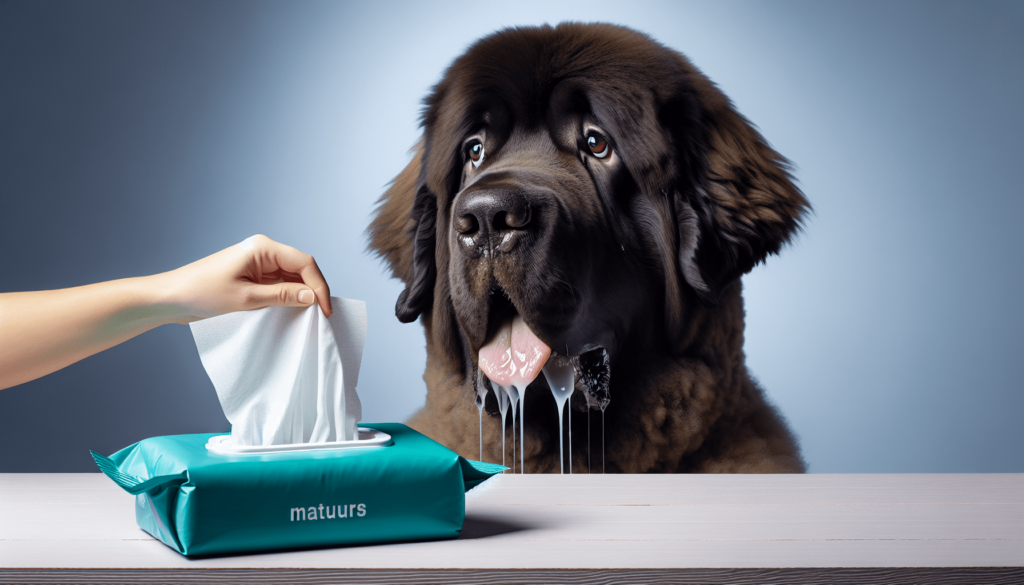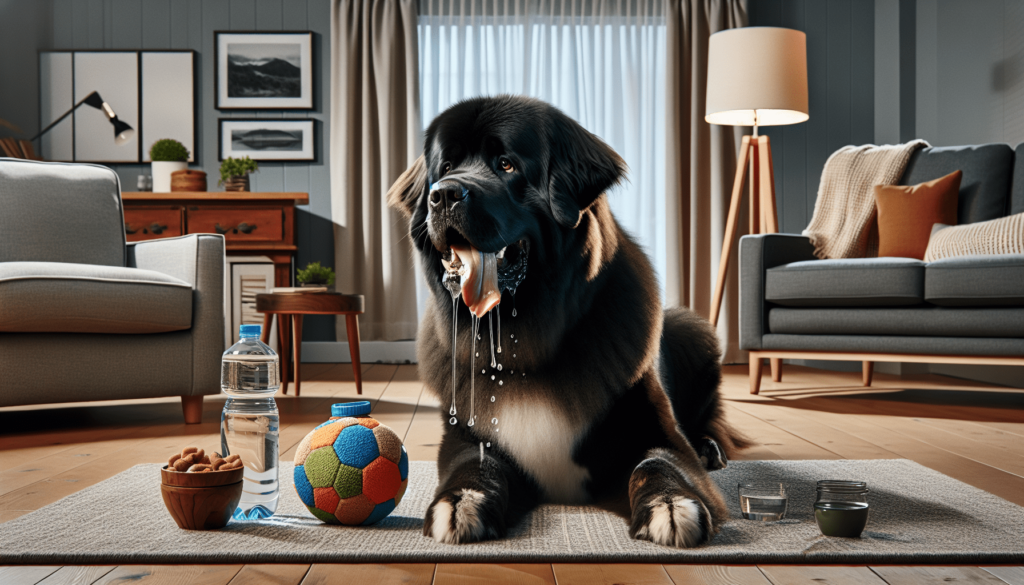Are you a proud owner of a lovable Newfoundland dog but struggling with their excessive drooling? Don’t fret! In this article, you will discover some helpful tips to reduce Newfoundland drooling and keep your furry friend dry and comfortable. From proper dental care to managing their food and water intake, these simple yet effective suggestions will assist you in tackling this common issue. So, say goodbye to soggy floors and embrace a drool-free life with your beloved Newfoundland!

Proper Feeding
Feeding your Newfoundland with the right food is essential for their overall health and can help minimize excessive drooling. Choose a high-quality dog food that is specifically formulated for large breeds or for dogs prone to drooling. These types of foods often contain ingredients that can help reduce saliva production and promote good digestion.
Choose the Right Food
Opt for dry kibble instead of wet or canned food, as wet food tends to increase drooling in dogs. Dry kibble not only helps keep your Newfoundland’s teeth clean but also encourages them to chew, which can reduce drooling. Look for a brand that has natural ingredients, high protein content, and is free from additives or artificial preservatives.
Avoid Overfeeding
It’s important to feed your Newfoundland the right amount of food to prevent excessive weight gain, which can contribute to increased drooling. Follow the recommended portion sizes provided by the dog food manufacturer and adjust based on your dog’s activity level and body condition. Overfeeding can lead to obesity, which can exacerbate drooling and other health issues.
Elevate Food Bowls
Elevating your Newfoundland’s food bowls can help them eat at a more comfortable height and reduce the chances of drooling. This is especially beneficial for larger dogs like Newfoundlands who are prone to bloating or gastrointestinal issues. Raised food bowls can also promote better digestion by preventing the intake of excessive air while eating.
Hydration
Proper hydration is crucial for your Newfoundland’s health and can also play a role in managing drooling. Follow these tips to ensure your dog stays adequately hydrated and to prevent excessive drooling.
Provide Fresh Water
Always provide your Newfoundland with access to fresh, clean water. Ensure their water bowl is clean and filled with fresh water throughout the day. Dogs may drool more when they are dehydrated, so keeping them hydrated can help minimize drooling.
Use Elevated Water Bowls
Similar to elevated food bowls, using an elevated water bowl for your Newfoundland can help reduce drooling. Raised water bowls allow your dog to drink at a more comfortable height, minimizing the chance of excess drool. Additionally, elevated water bowls can help prevent the intake of air while drinking, reducing the risk of bloating or digestive issues.
Regular Dental Care
Maintaining good dental hygiene is important not only for your Newfoundland’s oral health but also for reducing excessive drooling. Incorporate these practices into your dog’s routine to keep their teeth clean and their drooling under control.
Brushing
Regular brushing of your Newfoundland’s teeth can help prevent dental issues that may contribute to excessive drooling. Use a dog-specific toothbrush and toothpaste, and gently brush your dog’s teeth at least two to three times a week. Brushing not only removes plaque and tartar buildup but also helps maintain healthy gums.
Dental Chews
In addition to brushing, providing dental chews can help keep your Newfoundland’s teeth clean and healthy. Chewing on appropriate dental chews can help remove plaque, reduce tartar buildup, and stimulate saliva production, which can help control drooling. Opt for dental chews that are specifically designed for large dog breeds and consult with your veterinarian for recommendations.
Regular Vet Check-ups
Regular visits to your veterinarian are essential for maintaining your Newfoundland’s dental health and overall well-being. Your vet can perform professional dental cleanings and check for any underlying dental issues that may contribute to excessive drooling. They can also provide guidance on proper dental care techniques and recommend any necessary treatments or interventions.
Overall Health
Ensuring your Newfoundland’s overall health is in good condition can have a positive impact on managing drooling. Consider the following factors to promote their well-being and minimize excessive drooling.
Exercise and Weight Control
Regular exercise is important for your Newfoundland’s physical and mental health. Engage in activities that are suitable for their size and breed, such as daily walks, swimming, or playing fetch. Maintaining a healthy weight is also crucial, as obesity can worsen drooling. Consult with your veterinarian to determine the appropriate exercise regimen and caloric intake for your dog.
Manage Stress and Anxiety
Stress and anxiety can contribute to excessive drooling in dogs, including Newfoundlands. Implement strategies to help your dog manage stress, such as providing a comfortable and quiet space, using calming techniques like massage or aromatherapy, and using pheromone diffusers or natural calming supplements. Additionally, make sure your dog has plenty of mental stimulation through puzzle toys or training exercises.

Training and Discipline
Proper training and discipline can play a role in managing your Newfoundland’s drooling behavior. By teaching your dog specific commands and reinforcing positive behavior, you can help reduce drooling-related issues.
Control Excitement
Newfoundlands tend to drool more when they are excited, such as during playtime or when greeting visitors. Train your dog to control their excitement by using commands like “stay” or “leave it” when they start drooling excessively. Reward them with treats or praise when they remain calm and focused.
Teach the ‘Quiet’ Command
Training your Newfoundland to respond to the “quiet” command can be helpful in reducing excessive drooling. Whenever your dog starts drooling excessively, calmly say “quiet” and wait for them to stop drooling before rewarding them. Consistency and positive reinforcement will help reinforce this behavior over time.
Positive Reinforcement Training
Positive reinforcement training techniques can be effective in managing drooling issues. Reward your Newfoundland with treats, praise, or playtime when they exhibit good behavior and show signs of reduced drooling. By associating positive rewards with controlled drooling, your dog will be encouraged to exhibit the desired behavior.
Use of Bandanas or Bibs
Using a bandana or bib can be a practical solution to absorbing excess drool and protecting surrounding areas from getting wet or stained.
Absorb Excess Drool
Placing a bandana or bib around your Newfoundland’s neck can help absorb excess drool and prevent it from soaking into their fur or dripping onto surfaces. Choose bandanas or bibs made from absorbent materials, and make sure they are comfortable and properly fitted to avoid any discomfort for your dog.
Protect Surrounding Areas
When your Newfoundland is prone to excessive drooling, it’s important to protect areas of your home or car that may be exposed to drool. Use waterproof coverings or blankets on furniture, car seats, or floors to prevent staining or damage. Additionally, keep drool-absorbent towels handy to quickly wipe away any stray drool.
Limit Exposure to Triggers
Certain environments or situations can increase drooling in Newfoundlands. By minimizing exposure to these triggers, you can help reduce excessive drooling.
Avoid Hot and Humid Environments
High temperatures and humidity can make drooling worse for Newfoundlands. Avoid exposing your dog to excessively hot or humid environments, especially during outdoor activities. Provide shade, access to fresh water, and limit strenuous physical activity in these conditions to prevent overheating and excessive drooling.
Minimize Car Rides
Many Newfoundlands experience heightened drooling during car rides, particularly if they feel anxious or motion sick. Minimize car travel if your dog exhibits severe drooling during rides. If necessary, consult with your veterinarian for strategies to help reduce anxiety and motion sickness, such as medication or desensitization exercises.
Grooming and Coat Maintenance
Proper grooming practices, especially focused on your Newfoundland’s face and ears, can help manage drooling and maintain a clean and healthy appearance.
Regular Brushing
Regular brushing is important for maintaining the cleanliness and health of your Newfoundland’s coat. Brush your dog’s fur at least once a week, paying special attention to their facial and neck areas where drool tends to accumulate. Use a grooming brush suited for their coat type, and consider using a detangling spray to make brushing easier and more comfortable for your dog.
Trim Facial Hair
Trimming your Newfoundland’s facial hair can help minimize drool accumulation and prevent the hair from becoming a breeding ground for bacteria. Consult with a professional groomer who is experienced in working with Newfoundlands to ensure a proper and safe trim. Be cautious not to trim excessively, as the hair serves a protective purpose for their eyes and muzzle.
Keep Eyes and Ears Clean
Regularly clean your Newfoundland’s eyes and ears to prevent any infections or irritations that can contribute to excessive drooling. Use a veterinarian-approved eye cleanser and ear cleaner to gently remove any debris or buildup. Be cautious not to apply excessive pressure or insert anything deep into their ears, and consult with your veterinarian if you notice any signs of infection or persistent issues.
Manage Drool-related Infections
Excessive drooling can sometimes lead to infections, particularly in the folds of a Newfoundland’s skin. By taking preventive measures and treating existing infections promptly, you can minimize the discomfort for your dog.
Prevent Skin Infections
Newfoundlands have loose skin folds around their face and neck, creating an ideal environment for bacterial or fungal infections. Keep these areas clean and dry by gently wiping them with a clean, damp cloth on a daily basis. Avoid using harsh chemicals or strong detergents, as they may irritate your dog’s skin. If you notice any signs of redness, swelling, or odor, consult with your veterinarian for appropriate treatment.
Treat Existing Infections
If your Newfoundland develops a skin infection related to drooling, seek veterinary attention promptly. Your veterinarian may prescribe topical or oral medications to treat the infection and provide guidance on how to keep the affected area clean and dry. Follow their instructions carefully and monitor for any signs of improvement or worsening.
Consulting a Veterinarian
If you’ve tried various approaches to manage your Newfoundland’s drooling and haven’t seen significant improvement, it’s essential to consult with a veterinarian.
Seek Professional Advice
A veterinarian is the best resource to help identify the underlying cause of excessive drooling and develop a tailored approach for managing the issue. They can conduct thorough examinations, review your dog’s medical history, and perform any necessary diagnostic tests to determine the cause of the excessive drool.
Medical Interventions
In some cases, medical interventions may be necessary to address the underlying cause of excessive drooling in Newfoundlands. Your veterinarian may recommend medications, surgical procedures, or specialized treatments to help manage or resolve the issue. Follow your veterinarian’s guidance and attend regular follow-up appointments to ensure proper monitoring and adjustment of any treatment plan.
By implementing these tips and practices, you can take proactive steps to manage and reduce your Newfoundland’s drooling. Remember to prioritize your dog’s overall health and well-being, and consult with a veterinarian if you have any concerns or questions about excessive drooling. With proper care and attention, you can help your Newfoundland lead a happy and comfortable life, free from excessive drooling.
